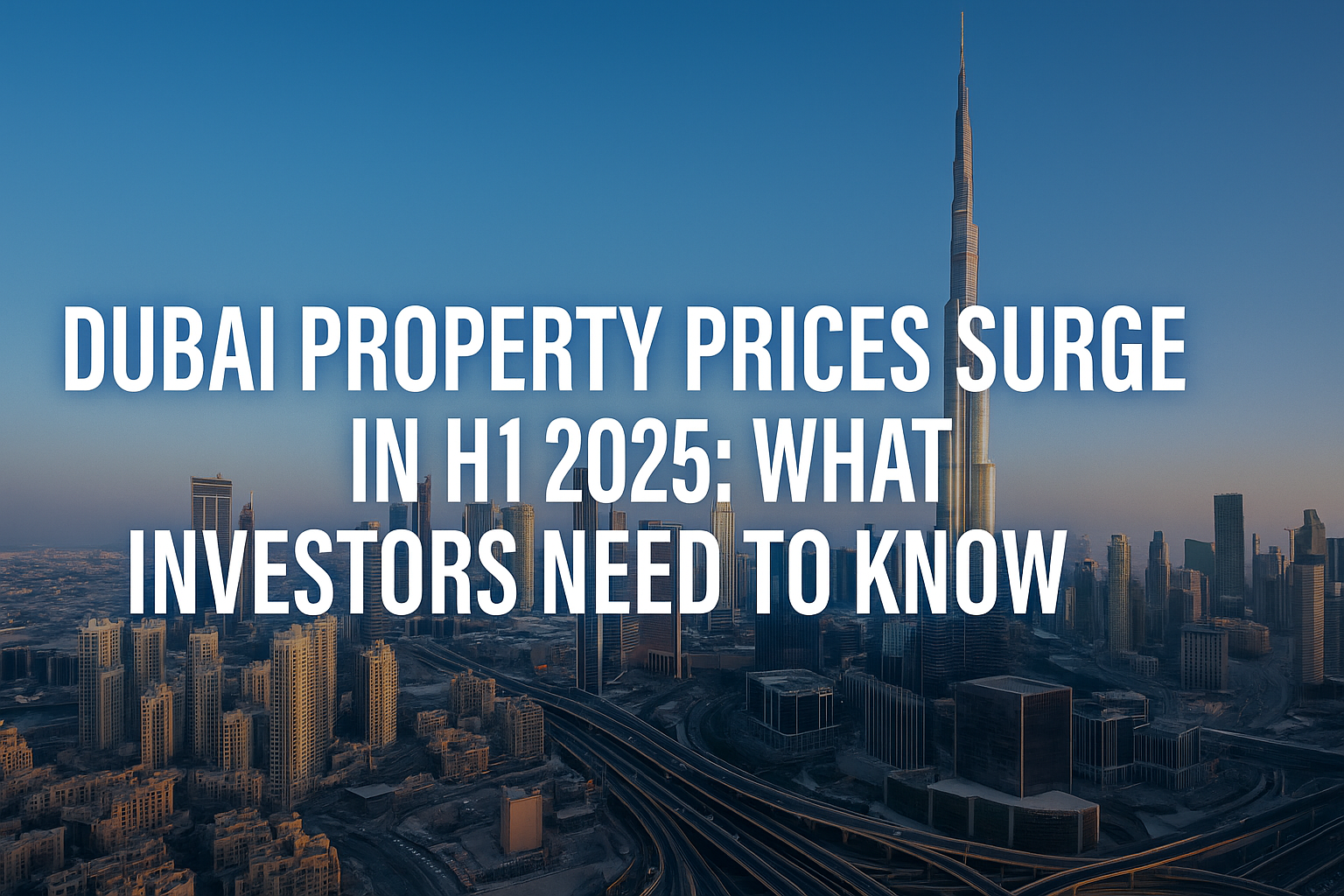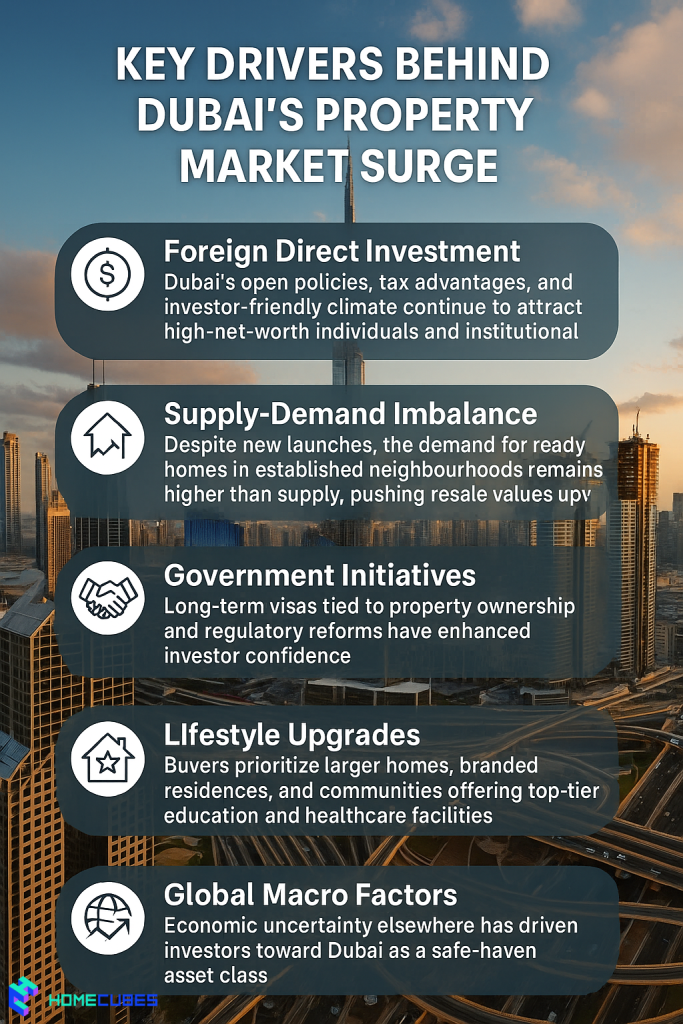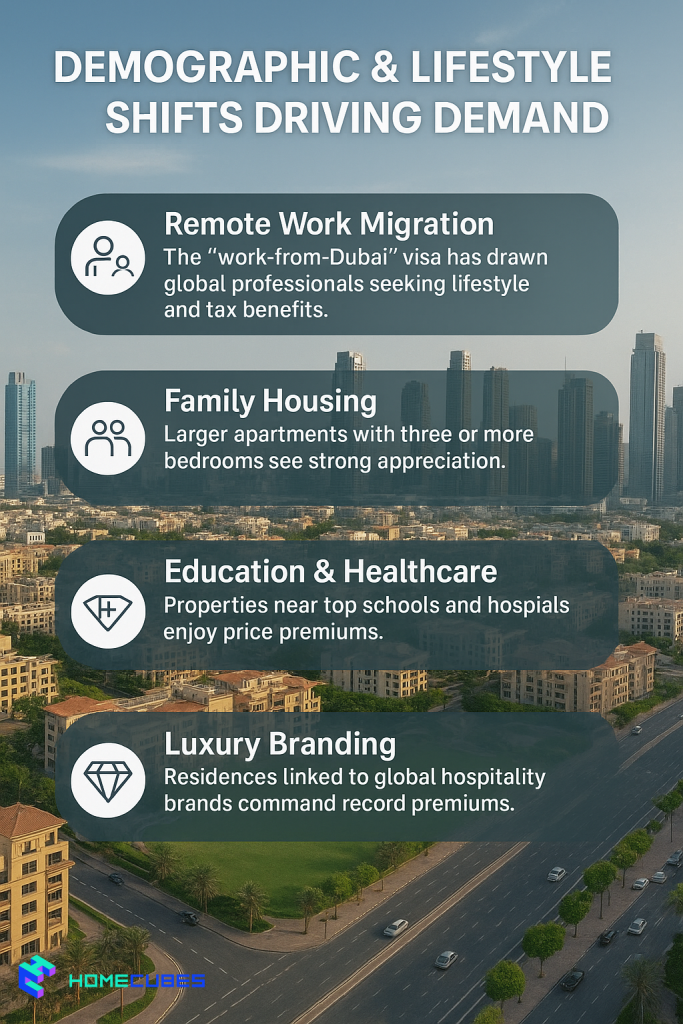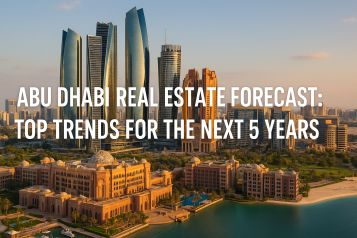

Table of Contents
- Introduction
- Market Overview: H1 2025 by the Numbers
- Key Drivers Behind the Surge
- Investor Profiles: Who Is Buying in 2025?
- Demographic & Lifestyle Shifts Driving Demand
- Sustainability and ESG in Dubai Real Estate
- Technology’s Role in Price Transparency & Market Access
- Risks and Challenges for Investors
- Opportunities in Dubai’s Property Market
- Case Study: Prime Apartments in Downtown Dubai
- Global Comparisons: Dubai vs. Other Global Cities
- Mistakes Investors Should Avoid
- Fees and Charges to Consider
- Outlook for H2 2025 and Beyond
- Frequently Asked Questions
- Conclusion
- Homecubes: Your Partner in Real Estate Tokenization
Introduction
Dubai’s property market has once again made headlines in 2025, cementing its reputation as one of the world’s most dynamic real estate hubs. In the first half of the year, Dubai real estate prices 2025 rose sharply, supported by record-breaking transaction volumes, high investor confidence, and an influx of wealthy individuals relocating to the UAE.
The current numbers and the outlook for Dubai real estate market in 2025 for the next five years are impressive. Transaction values hit AED 431 billion in just six months, reflecting both strong domestic demand and substantial foreign investment (Dubai Media Office). But beyond the figures lies a deeper story — one of shifting demographics, global wealth migration, sustainability-driven demand, and technological innovation reshaping property ownership.
Dubai’s real estate market continues to outpace global peers in 2025. Luxury property prices soared 147% from 2019-2024 (Knight Frank), dwarfing London’s 20% and New York’s 10% growth. With 16.9% prime sector gains by Q3 2024, Dubai’s 7-9% rental yields crush Paris (3%) and…
— Towqeer Gilkar (@towqeerdxb) March 18, 2025
For investors, this surge offers opportunities but also challenges. The key is understanding the forces driving the market, identifying sustainable growth areas, and avoiding common pitfalls.
Market Overview: H1 2025 by the Numbers
Dubai’s performance in the first six months of 2025 has been nothing short of historic:
- Total Transaction Value: AED 431 billion, up 25% compared with H1 2024.
- Number of Deals: Over 125,000 real estate transactions completed.
- Investor Participation: Nearly 95,000 investors, with around 59,000 first-timers.
- Investor Contribution: AED 326 billion worth of investment inflows.
Property Segments
- Apartments: Average prices rose by 13% YoY. Larger family-sized units outperformed studios.
- Villas: Price growth slowed to around 7% after sharp increases in 2023–24.
- Off-Plan: Strong demand persists, particularly in mid-market communities with flexible payment plans.
- Resale: Ready homes in Downtown Dubai and Palm Jumeirah surged by ~15% in value.
Rental yields averaged 7.2% for apartments and 5% for villas, according to Cavendish Maxwell. While still attractive globally, yields are under mild pressure as property prices rise faster than rents.
Key Drivers Behind the Surge

- Foreign Direct Investment
Dubai’s open policies, tax advantages, and investor-friendly climate continue to attract high-net-worth individuals and institutional capital. - Supply-Demand Imbalance
Despite new launches, the demand for ready homes in established neighborhoods remains higher than supply, pushing resale values upward. - Government Initiatives
Long-term visas tied to property ownership and regulatory reforms have enhanced investor confidence. - Lifestyle Upgrades
Buyers prioritize larger homes, branded residences, and communities offering top-tier education and healthcare facilities. - Global Macro Factors
Economic uncertainty elsewhere has driven investors toward Dubai as a safe-haven asset class.
Investor Profiles: Who Is Buying in 2025?
The market has diversified considerably including local and global investors flocking into Dubai property market in 2025:
- GCC Investors: Saudis and Kuwaitis remain active in luxury villa segments.
- European Investors: British, French, and German buyers target high-end apartments.
- Asian Investors: Indians, Pakistanis, and Chinese buyers dominate mid-market demand.
- Institutional Capital: Global funds are purchasing portfolios of rental properties.
- Millennials: Younger investors, often first-timers, are entering through off-plan opportunities.
Demographic & Lifestyle Shifts Driving Demand

- Remote Work Migration: The “work-from-Dubai” visa has drawn global professionals seeking lifestyle and tax benefits.
- Family Housing: Larger apartments with three or more bedrooms see strong appreciation.
- Education & Healthcare: Properties near top schools and hospitals enjoy price premiums.
- Luxury Branding: Residences linked to global hospitality brands command record premiums.
Sustainability and ESG in Dubai Real Estate
Sustainability is no longer optional. It’s a market driver:
- Green Certifications: LEED-certified buildings attract higher valuations.
- Energy Efficiency: Lower utility bills enhance affordability.
- Investor Demand: ESG-focused funds are increasingly allocating to Dubai’s green projects.
The alignment with the UAE’s Net Zero 2050 vision adds long-term resilience to sustainable assets.
Technology’s Role in Price Transparency & Market Access
- Blockchain Registries: Pilot projects with the Dubai Land Department make title transfers more secure.
- Digital Mortgages: Fast approvals improve access for first-time buyers.
- Tokenization: Platforms like Homecubes are preparing to democratize ownership by offering fractional real estate investment (pending licensing).
Risks and Challenges for Investors
- Yield Compression: Rents are not rising as fast as property prices.
- Interest Rate Pressures: Global increases in borrowing costs could slow leveraged demand.
- Oversupply Concerns: New deliveries in some zones may outpace demand by 2026.
- Affordability Gaps: Middle-income buyers are increasingly priced out.
Opportunities in Dubai’s Property Market
| Segment | Opportunity | Risk |
| Prime Resale | Strong capital appreciation in Downtown, Palm Jumeirah | High entry cost |
| Mid-Market Off-Plan | Flexible payment plans, rising demand | Developer delays |
| Family-Sized Apartments | Long-term rental stability | Higher upfront cost |
| Serviced Plots | Strong growth in established areas | Regulatory hurdles |
According to Knight Frank’s Private Capital Report 2025, the UAE has experienced a 98% surge in dollar millionaires over the past decade, making it the second-fastest growing wealth market worldwide. In 2024 alone, the UAE welcomed over 7,200 new millionaires, up from 4,700 in 2023. This inflow of wealth underpins demand for Dubai property, especially in the prime and luxury segments.
Case Study: Prime Apartments in Downtown Dubai
Resale two-bedroom apartments in Downtown Dubai appreciated 15% year-on-year in H1 2025. Rents increased by 7%, producing net yields of ~6.5%.
An investor who purchased in early 2023 for AED 2.2 million now holds an asset valued at AED 2.53 million while enjoying steady rental income. This highlights the strength of established, centrally located communities.
Global Comparisons: Dubai vs. Other Global Cities
- London: Yields average 3%, with higher property taxes.
- New York: High closing costs and ongoing taxation reduce ROI.
- Singapore: Strict ownership laws limit foreign access.
- Dubai: Offers zero personal income tax, high gross yields, and a welcoming regulatory framework.
Dubai’s competitive edge is evident in both returns and investor accessibility.
Mistakes Investors Should Avoid
- Overlooking service charges when calculating net yield.
- Taking on too much debt with variable-rate mortgages.
- Buying speculative off-plan projects in underdeveloped areas.
- Neglecting due diligence on developer track record and delivery history.
Fees and Charges to Consider
Example: AED 3,000,000 apartment purchase.
- DLD Fee (4%): AED 120,000
- Registration Fee: AED 4,000
- Brokerage Fee (2%): AED 60,000
- Service Charges: AED 15–25 per sq. ft. annually
Total upfront cost: ~AED 184,000 (not including annual maintenance).
Outlook for H2 2025 and Beyond
Analysts expect growth to moderate in the second half of 2025, but fundamentals remain strong.
- Expo Legacy Projects: Continued demand from tourism and infrastructure upgrades.
- Population Growth: Forecast to surpass 3.7 million residents by 2026.
- Developer Pipelines: New launches may balance supply but won’t dent prime demand.
The long-term trajectory suggests sustainable growth, with prime and mid-market communities likely to outperform speculative projects.
Frequently Asked Questions
- Will Dubai real estate prices continue rising in 2025?
Yes, but growth is expected to slow in H2 compared with the record-breaking first half. - Which areas are best for investment?
Prime zones like Downtown Dubai, Palm Jumeirah, and new developments such as Dubai Creek Harbour. - What are average yields?
Apartments around 7%, villas about 5%. - Is off-plan investment safe?
Yes, when buying from reputable developers with escrow-backed projects. - How does Dubai compare globally?
Dubai offers higher yields and lower taxes than London or New York. - What fees apply?
Expect DLD, brokerage, registration, and service charges. - Can foreigners buy?
Yes, in designated freehold zones. - Does sustainability influence value?
Yes, green-certified buildings are commanding premiums.
Conclusion
The surge in Dubai real estate prices 2025 reflects Dubai’s transformation into a truly global investment destination. The first half of the year was marked by record-breaking transactions, rising foreign capital inflows, and growing domestic participation.
While opportunities abound in prime resale, family-oriented apartments, and sustainable projects, investors must also weigh risks such as yield compression and affordability challenges. Long-term success will come from focusing on established communities, reputable developers, and assets aligned with demographic trends.
Dubai’s market is no longer just a speculative play — it is maturing into a stable, globally competitive ecosystem.
Homecubes: Your Partner in Real Estate Tokenization
At Homecubes, we believe property investment should be accessible, transparent, and future-ready. While our real estate tokenization platform license is under review by VARA, we are preparing to launch services that will allow investors to:
- Participate in fractional property ownership with smaller capital outlays.
- Diversify holdings across premium and mid-market assets.
- Trade real estate tokens securely using blockchain technology.
👉 Be among the first to experience the future of property investment by contacting us here. Once our license is approved, you’ll gain access to a new way of investing in Dubai’s booming real estate sector.










